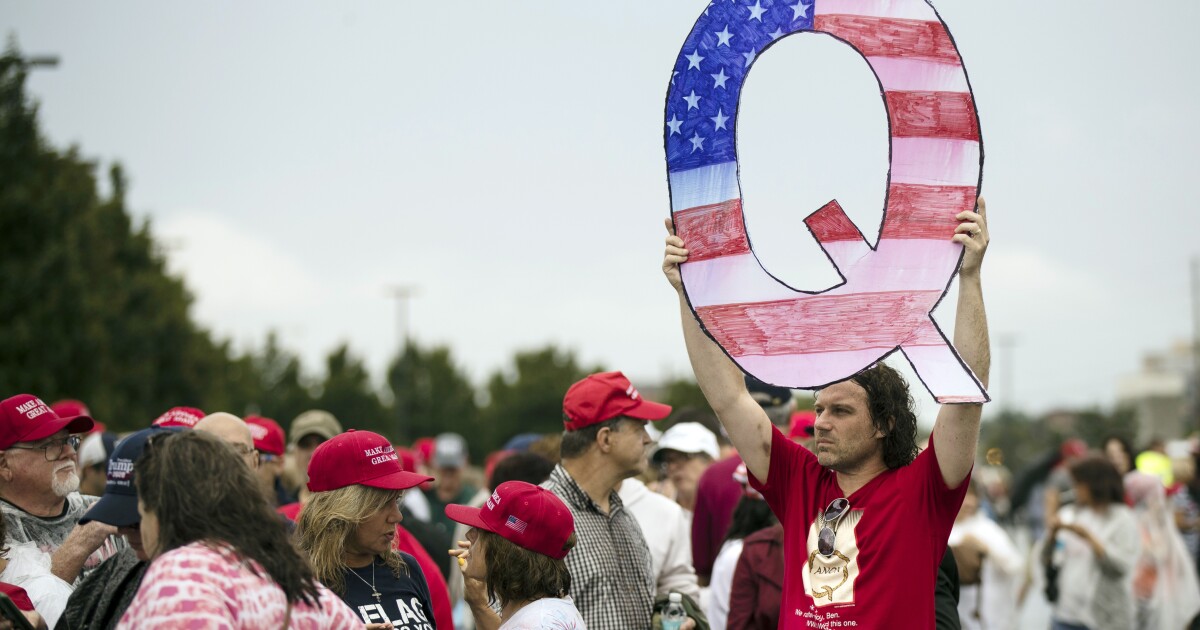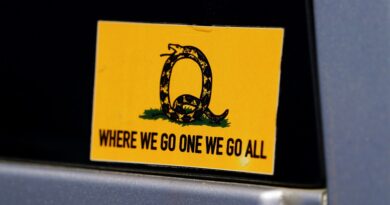Why conspiracy theories about pedophilia hold sway with conservatives

In modern presidential campaigns, unsubstantiated conspiracy theories about pedophilia are now almost as routine as stump speeches, poll results and televised debates.
In 2016, Democrats’ imagined penchant for child predation was manifested in the made-up charge that Hillary Clinton presided over a child sex-trafficking ring. Adherents of this fiction spun an elaborate online fantasy that the presidential candidate — along with her husband, former President Bill Clinton, and other prominent Democrats — was running such an enterprise from a nonexistent network of tunnels underneath a real-life pizza joint in Washington, D.C.
Clinton lost the election, but the fabricated charge that a secret cabal of pedophiles rules the Democratic Party remained a central feature of the QAnon conspiracy theory. Its adherents are allied with President Trump, the man they see as leading the charge against these “deep state” elites.
Now similar fictions are being aimed at Joe Biden, this year’s Democratic presidential nominee.
The hashtag #PedoBiden has been on the rise in recent months, and Trump gave it a boost by retweeting a video from an anonymous Twitter account that purported to show Biden in the act. The issue came up in Trump’s Thursday night town hall, when the president refused to repudiate QAnon and commended its aherents for being “strongly against pedophilia.”
In fact, the woman shown with Biden’s hands on her shoulders and his mouth to her ear was in her 40s at the time, and she has denounced the smear campaign against the former vice president. But Trump’s elevation of the false pedophilia claim ensures its place in the firmament of conspiratorial fabrications.
It also raises questions. Why do conspiracy theories built around pedophilia hold sway for so many? And why do their adherents tend to favor Trump?
Of all the epithets hurled by politicians through history, an accusation of child sexual abuse strikes particularly deep chords, experts say.
Those chords resonate across the political spectrum. They rivet attention by evoking vulnerable children. They engage one of humankind’s most primitive and powerful emotions — disgust. And they place members of this evil cabal in a class beyond redemption.
Like all conspiracy theories with legs, this one draws credibility from evil deeds we know to be real. After all, the cases against Catholic clergy, the financier Jeffrey Epstein and disgraced Olympic gymnastics team doctor Larry Nassar all suggest that child sexual abuse may be perpetrated by fellow citizens we may once have trusted and admired.
But some researchers have gathered evidence that conspiracy theories involving pedophilia tend to exert a stronger and more enduring hold on people who identify as conservative, or who embrace policy positions strongly identified with American conservatism.
In an influential 1964 article, Columbia University political scientist Richard Hofstadter described a particular strain of American partisans who employed “heated exaggeration, suspiciousness, and conspiratorial fantasy” in their discourse. These people — a group typified by Sen. Joseph McCarthy, who initiated a range of investigations to root out suspected Communists in the federal government — “believe themselves to be conservatives and usually employ the rhetoric of conservatism,” he wrote.
Although Hofstadter’s thesis came in for criticism, it also spurred research. Over the next 44 years, at 88 studies conducted in 12 countries and involving over 22,000 participants drew links between people who embrace conservative ideologies and attributes such as death anxiety, intolerance of ambiguity and uncertainty, and personal needs for order, structure and closure.
And findings published in 2020 offer further evidence that it fits contemporary politics in the United States, the study’s authors say.
In four separate experimental studies using various measures of political ideology and openness to conspiracy belief, a team of social psychologists and political scientists led by Sander van der Linden of Cambridge University in England found that conservatives in the United States were “significantly and substantially more likely than liberals to embrace conspiratorial ways of thinking.”
Drawing from nationally representative survey samples involving 2,500 Americans, the researchers found a relationship between conservatism and conspiratorial thinking that was “positive, linear, and statistically robust,” they reported in the journal Political Psychology.
Although some research suggests that extreme liberals are just as prone to conspiracy belief as extreme conservatives, Van der Linden and his colleagues did not observe this. Both in their large samples and in smaller groups designed to retest their findings, they found that conspiracies were more readily embraced by people on the far right than on the far left.
Against this backdrop, conspiracy theories that feature pedophilia offer “kind of a perfect storm” of circumstances to foster these misguided beliefs, according to UCLA evolutionary anthropologist Daniel M.T. Fessler, who wasn’t involved in the Political Psychology study.
For starters, we are all primed by our mammalian brains to give credence to such charges, said Fessler, whose research focuses on the conditions in which conspiracies thrive. As a species that gives birth to helpless offspring and socializes our young over many years, humans respond to threats to a child’s well-being with fierce arousal.
In two experiments that recruited close to 600 parents of young children Fessler has shown that both parenthood and the actual presence of a young child enhance our distress when we perceive a threat to a child.
Since we depend on the group to protect our young, we have all evolved to respond to the threat of a child’s harm with horror and disgust, he said.
And that disgust is a powerful teacher. The putrid scent of spoiled foods and the overt signs of disease probably elicit feelings of disgust to ensure we avoid the dangers of poisoning or contagion: It is a “hallmark emotion of fear,” Fessler said. Researchers have found that urban legends with a yuck factor are more likely to be remembered and passed on than those without.
At the same time, neuropsychological studies have demonstrated that the brain’s responses to moral and physical disgust strongly overlap. It’s a sign that humans mark one another’s behavioral transgressions as evidence of danger, and that we’ll keep a safe distance from the people who engage in them.
In his tweets, Trump routinely expresses disgust at policies he opposes, the people who espouse those policies, or the places his perceived adversaries come from. Since taking office in 2017, the president’s Twitter offerings have included the words “disgust,” “disgusted” or “disgusting” at least 54 times, often accompanied by words such as “sick,” “vile,” “dangerous” and “filthy.”
Either deliberately or subconsciously, Trump’s rhetoric also capitalizes on another human inclination: In general, we believe and remember bad things more than neutral or pleasant ones.
This is the natural result of the evolutionary principle known to psychologists as “negatively biased credulity.” Essentially, it’s the idea that when it comes to enhancing our prospects for survival, it’s more important to remember and put stock in signals of danger than it is to heed the lessons of things that are neutral or pleasurable.
Believing a neighbor’s account of discovering a hornet’s nest, for instance, might save you from getting stung repeatedly, and perhaps from dying of anaphylactic shock. By contrast, you could forget or discount your neighbor’s tale of finding an unusual rock, or even a shady grove, and never pay a price.
This discrepancy has been well established in psychology experiments: Humans are generally more likely to believe and remember people, places or things that suggest danger than we are to believe or remember information that is likely irrelevant to our immediate survival.
But for some people, that negative bias is more pronounced.
Fessler’s experiments suggest that people who lean toward conservative positions are more likely to believe messages of danger than those who lean liberal.
In surveys conducted in September 2016, 948 American adults across the political spectrum were asked by Fessler’s team to rate how strongly they believed or disbelieved 16 assertions, almost all of which were false. Some of the assertions suggested neutral or happy outcomes, while others hinted at hazards that could be serious.
Plenty of test subjects were taken in by false claims about both hazards and benefits. And participants across the political spectrum showed some “negativity bias” in deciding what to believe.
But when a bogus claim raised a prospective danger, respondents who embraced conservative political views were slightly more likely to believe it than were those who adhered to more liberal political positions, Fessler’s team found.
Adding pedophilia to a list of political charges thus has the power to tilt an ordinary conspiracy story into danger territory, said University of Chicago political scientist Eric Oliver, author of the book “Enchanted America: How Intuition and Reason Divide Our Politics.”
Conspiracy beliefs that are more run-of-the-mill — that a cabal of greedy bankers runs the world’s economy, or that the moon landing was faked — just don’t carry the same emotional freight as a charge of child exploitation, he said.
QAnon initially mobilized around the claim that the “deep state” was working to thwart President Trump. But the narrative became a more compelling tale of moral struggle when those enemies were accused of harming children in a particularly horrific way, Oliver said.
Oliver’s research focuses not on ideology but on the “thinking styles” that differentiate people who are inclined to believe conspiracies and those who aren’t. What divides Americans, he argues, is not so much liberal vs. conservative as it is cognitive habits: Those who rely heavily on their intuitions and tend to believe that unseen forces guide our lives appear to be more prone to believe conspiracies than are people who embrace analysis and look for scientific explanations.
For people whose intuition tells them that there’s something rotten at the top, Oliver said, the addition of a pedophile conspiracy may make an otherwise unsatisfying narrative simply too much to resist.
“That bureaucracies have their own agenda — that’s just kind of politics,” he said. Add pedophiles to the mix, and “they’re not just self-interested bureaucrats. They’re evil people.”
*** This article has been archived for your research. The original version from Los Angeles Times can be found here ***


